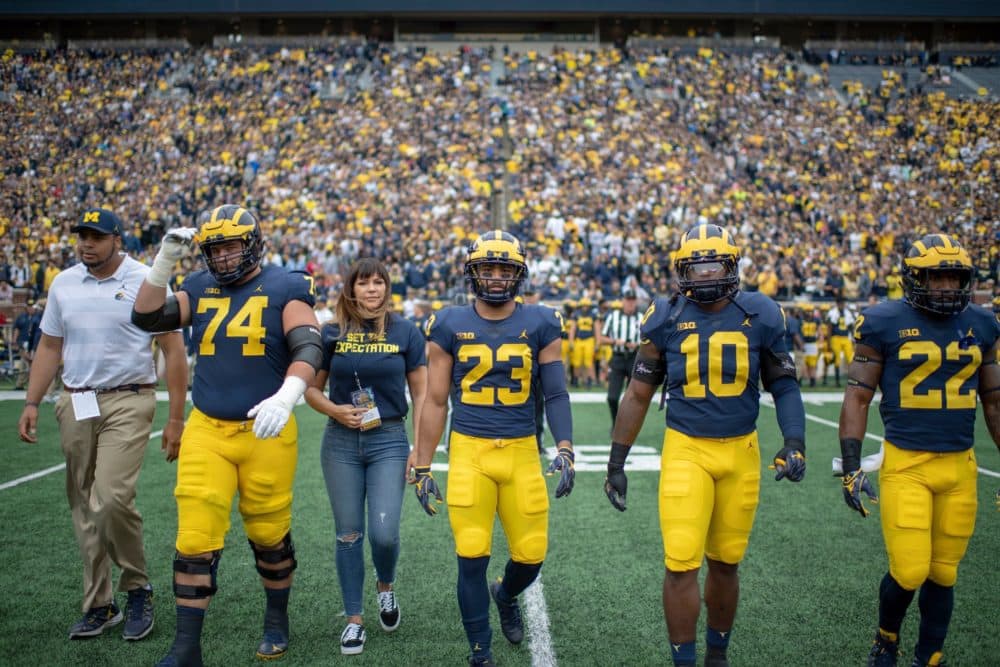Advertisement
How Rape Survivor Brenda Tracy Found Her Biggest Fans

This story is part of Only A Game's 2019 Thanksgiving Leftovers Show. Find the full episode here.
Brenda Tracy is a rape survivor and an advocate. Her goal is to get men involved in the fight against sexual violence. So she travels — often 40 weeks a year — speaking in locker rooms and team rooms and university lecture halls, telling strangers about the worst day of her life.
"I kind of forget where I am sometimes," Brenda says. "So half the time I don't even know what time zone I'm in."
Most of the time, Brenda is standing in front of athletes — almost always men at colleges like Michigan, Nebraska, Arkansas, Stanford. And she almost always starts with a question: Who here is under the age of 25?
"And then I tell them that you could be my child, because my sons are 24 and 25," Brenda says.
"I want you to think about that," Brenda told the audience at the 2018 National Character and Leadership Symposium at the U.S. Air Force Academy. "Because seriously, as I share my story today, how would you feel if you were? What if you were my son or my daughter, and you were sitting on that side? And if it was your mom up here talking about this story and what she went through?"
"And then do you tell them the story of your rape?" I ask.
"Yes, we start off with that," she answers. "It's hard for everybody in the room. And I usually cry — well, I always cry — but, yeah. I go into really graphic detail about it. I actually reopen that wound, and I walk them through it."
We’re not going to go into detail today. But here’s the short version: In 1998, Brenda Tracy was a single mother of two young boys. She was visiting an apartment near the campus of Oregon State University. She was given a drink — she believes it was drugged. And, over the next six hours, she was sexually assaulted by four men — two of them played football for Oregon State.
Brenda reported the rape the next day. She told the police. She told the school. But she says the prosecutor told her that she didn’t have a case. So she dropped the charges, and for the next 16 years ...
"Every day I literally just wanted to die," Brenda says. "I felt that those men had ruined me. Who would ever love me? Who would ever respect me? How could I ever talk about this to anyone? How could I ever be in a relationship? How could my children ever respect me? What if my sons — what were they gonna do when they found out about their mom? How could they ever respect me? Not be ashamed of me? Not be embarrassed of me?"
Advertisement
A Transformative Moment
"I hid it from them for a long time," she continues. "My older boy was 17 before I told him. We kind of came to a space where I knew I was either going to be visiting my son in prison, or my son was gonna be dead. So in that moment, I felt like, 'OK, I need to tell him who I am and why I am the way that I am.' Because we had a very contentious relationship while he was growing up.
"So, I remember we sat in the car, and I cried. And I told him what happened to me. And I said, 'Please don't be mad at me. Please don't be ashamed of me. I'm so sorry.' And he kind of looked at me, and he's like, 'Mom, why would I be ashamed of you? You did nothing wrong.' And that really surprised me. I was not expecting that response from him.
"But, then, the other thing that he said to me that broke my heart was — he said, 'So, you mean all these years it wasn't my fault?' And what he meant by that was, for those 16 years as I was raising him, as I was dealing with depression, couldn't get out of bed, angry, irritated, you know, he was blaming himself that he had done something wrong all those years.
"And so that moment for us was a transformational moment. He looked at me in a different way. He looked at me as a mom who was just doing the best that she could to survive her trauma. And he is my biggest fan. Both my boys are.
"People don’t always realize that it’s not just about the survivor. It’s not just the victim that has survived, but it’s the families, too. You know, my sons are survivors."
Neither of Brenda’s sons has seen her speak. She says she doesn’t want them to have to hear the details. But they know the work their mom does, travelling the country, talking to athletes about putting an end to sexual violence — it’s important.
"It's amazing for them to see the love from the teams that I get, and, you know, the players that support me," Brenda says.
And there’s one more aspect of all of this that Brenda didn’t expect. When those athletes reach out to thank her for sharing her story, they often tell her something else. Many of them say that after hearing her speak, they went home and called their moms.
Our original story on Brenda Tracy's fight against sexual violence aired on Jan. 26, 2019.
This segment aired on November 30, 2019.

